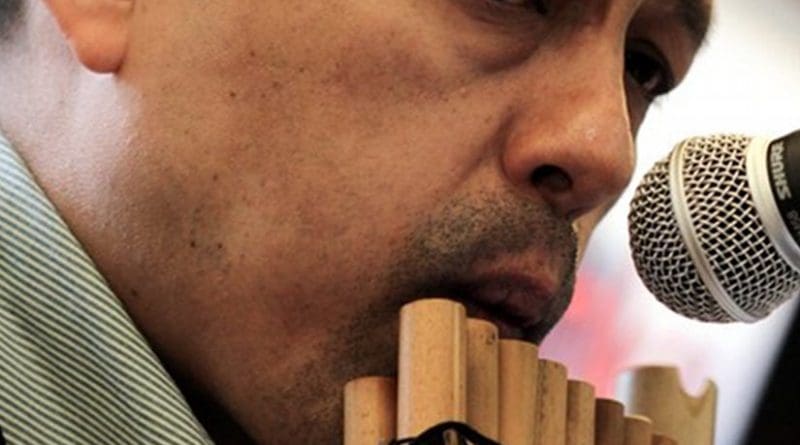Pacha Chalwanka: An Oasis From Peru In The Hustle-Bustle Of Jakarta
By Nia S. Amira
When we met at the “local women gathering” in Giriloka Park, Serpong Banten, Indonesia on December 7, 2015, Pacha Wilmer — a Peruvian musician who has visited one third of the world bringing the art of traditional Peruvian music to many flamboyant audiences — was telling why he fell in love with Indonesia. Pacha, who slightly looks like Ariel Noah, a famous Indonesian musician, was born the second child of six siblings in Arequipa, a tiny city in the mountainous area of Peru about 1,400 km from Lima, the capital city.
Pacha was interested in Peruvian traditional music back in 1984. At that time, a younger Pacha was influenced by the ethnic music that was playing on the radio. This was Andean music, performed by a local music group, and it touched the feelings of a man who liked to play football. From that time forward, he started to learn various traditional musical instruments from a friend.
After just three months had passed, Pacha, a talented musician, could already play Zampona, Quena, Chile, Maltas, Bastos, Marimachas, Semi-Toyos, and Toyis, which would later bring him to Indonesia. But 1989 was the beginning of his formal venture into music, and he continued to explore his talents through performances in various places and occasions, and in 1991 Pacha, a melancholic man, began his career as a professional musician playing ethnic music in Portugal and Spain.
Despite Peru being far away from Indonesia, people from both countries feel very close. Peru is part of the Latin American countries with Spanish as an official language and is home to a variety of cultures that spread from the Norte Chico civilization, and the Inca Empire in Caral, which is also one of the oldest civilizations in the world. While some countries in South-Asia were still in the grip of colonialism, Peru gained its independence in 1821 from Spain and inherited the culture that melded in a positive way with the local flavor.
As a musician, Pacha is consistent with his own choice, playing traditional Peruvian music despite competing with modern musical performances. A man who loves the color blue, Pacha continued his journey with a Peruvian ethnic group that played in Brazil during 1997-2002.
Pacha is a man with only a simple dream and that is his desire to have more performances in as many places as possible, although he often performs in Indonesian national TV. Pacha, who has also spent three years in Japan, feels that Indonesia is a suitable and strategic place for him to introduce Peruvian music to foreign countries, at least to all parts of South-Asia and also because he considers that this is part of his responsibility.
And indeed, Pacha is adaptable with Indonesia and its friendly people. Asked about his favorite food, the 49-year-old answers vigorously that besides Ceviche (typical cuisine of Peru, a raw fish plate that is marinated with lemon juice) Pacha also says he likes “Rendang”, a stew spicy beef and chicken curry dishes from West Sumatra, and cold lychee tea as his favorite drink.
When playing the Andean instrumental repertoire, the music that comes from the Incas, his ancestors, Pacha plays very well. Music is a universal language; with only the time, direction, and the beautiful melody always delivered in a charming way that touches the feelings of those who listen.
Listening to his music one can almost feel the cold wind blowing from the Andes, carrying your mind and soul away to Peru.
One such instance, occurred recently when Pacha played, “Sunquyman” — a song that was written in Quechua, the Incas language that means “Hacia mi Corazon” in Spanish or Towards the Heart — to close out his performance on a hot sunny day, and yet the feeling was overwhelmed by mixed illusions, of between Peru and Indonesia, and the Andes and Bromo.

